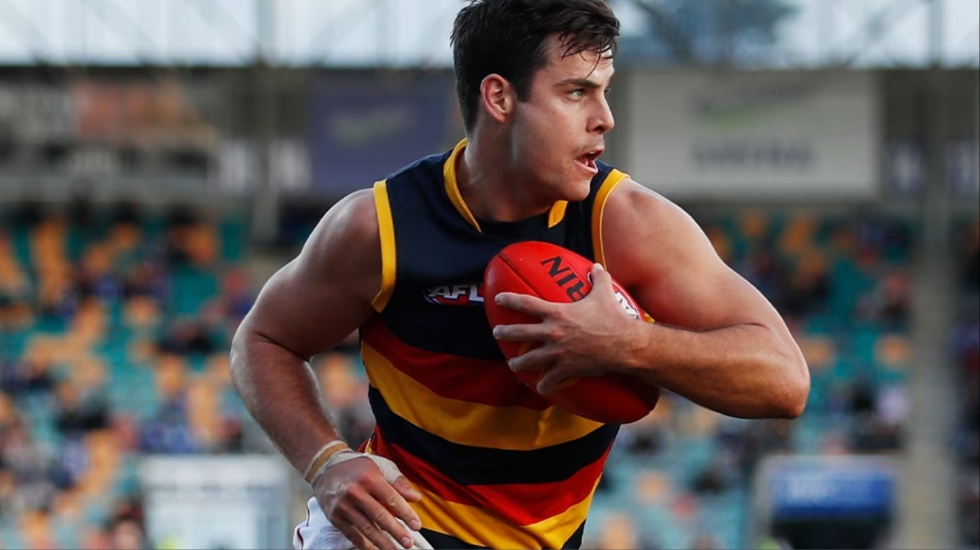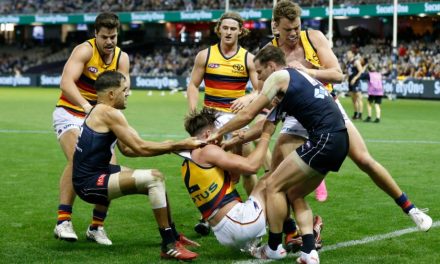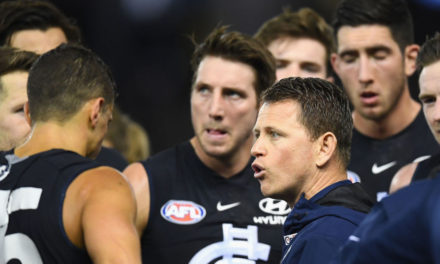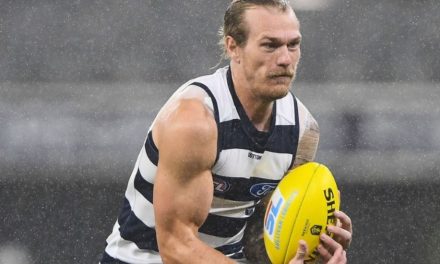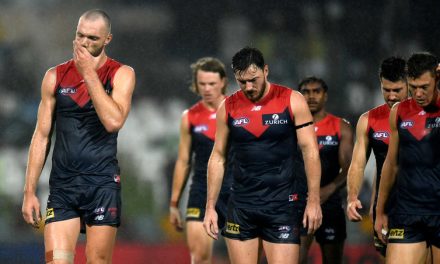Darcy Fogarty is ready to take the competition by storm and there’s no reason why he shouldn’t kick 50 majors in 2024. Photo: AFL MEDIA
ADELAIDE
2023 record: 11 wins, 12 losses (10th)
THE INS
Chris Burgess (Gold Coast), Daniel Curtin (Claremont), Charlie Edwards (Sandringham Dragons), Oscar Ryan (Murray Bushrangers)
THE OUTS
Tom Doedee (Brisbane), Paul Seedsman (retired), Shane McAdam (Melbourne), Andrew McPherson (delisted), Jackson Hately (delisted), Tyler Brown (delisted), Fischer McAsey (retired), Tariek Newchurch (delisted)
THE STRENGTHS
With the top-ranked attack in the competition last year, it’s hard to go past their forward line. Only runner-up Brisbane (seven) and another finalist in Sydney (seven) had more players kick at least 20 goals in 2023 than the Crows. Former captain Taylor Walker seems to have found the fountain of youth, young twin towers Darcy Fogarty and Riley Thilthorpe appear to be on the cusp of breaking out, while the likes of Izak Rankine, Josh Rachele and Luke Pedlar ensure no shortage of excitement at ground level. It’s little wonder then that Adelaide was also ranked first for marks inside 50 and second for scores per inside 50 last year. With skipper Jordan Dawson leading the way, it’s easy to understand why so many believe the Crows are on the verge of big things in 2024 and beyond. Dawson has been an inspired recruit, having not put a foot wrong in his first two years back home in Adelaide, and he produced a career-best year last season which culminated in All-Australian honours and a best-and-fairest. The former Swan has been a key cog in an emerging midfield unit that also features the impactful Rory Laird and Ben Keays as well as impressive youngsters such as Chayce Jones, Mitch Hinge, Jake Soligo and Harry Schoenberg. In 2023, the Crows were No.1 for marks and third for disposals.
THE WEAKNESSES
But for all of their positives, the Crows failed to make the finals last year, and if they want to take the next step in 2024, overcoming the mental hurdle of consistently closing tight games will be critical. Last season, Adelaide had a terrible record in games decided by 16 points or less (1-7), including five matches they lost by a kick. All seven of those defeats were against league heavyweights Collingwood (twice), Brisbane, GWS (twice), Melbourne and Sydney, which demonstrates that while they’re not far off the pace, the Crows still have a lot of work to do to bridge the gap on the best teams. And in four of those seven losses, Adelaide coughed up a three-quarter-time lead. Undoubtedly, the club would’ve already gone to work on the psychological aspect of the game this summer. As potent as the Crows are up front, they’re just middle of the road in defence (ninth), which goes a long way to explaining why they went for Claremont key back prodigy Daniel Curtin with pick eight in the draft to help the likes of Jordon Butts, Nick Murray and Josh Worrell – especially with Doedee going to Brisbane. Adelaide is pretty light on in the ruck as well, and it’s essentially a case of Reilly O’Brien or bust this year. Coach Matthew Nicks would probably also like to see an improvement in contested possessions and clearances, given his team was ranked eighth in both categories last season, as that would also help take some pressure off his backline. And with their deadly forward line at their disposal, they will pick up an extra three or four wins this year if they can rise up from their 2023 ranking of seventh for inside 50s.
PLEASE HELP US CONTINUE TO THRIVE BY BECOMING AN OFFICIAL FOOTYOLOGY PATRON. JUST CLICK THIS LINK.
ONE TO WATCH
At 24 years of age, Fogarty is ready to take the competition by storm. The young forward has been building nicely the last three years, with consecutive career-best hauls of 24, 33 and 34 goals. But the power forward has all the attributes to take his game to the next level this season. With enviable strength and a booming right boot, there’s no reason why he shouldn’t kick 50 majors in 2024.
UNDER THE PUMP
After seven years on the Crows’ list, season 2024 is a huge one for out-of-contract key forward Elliott Himmelberg. Across his 41 games, the 25-year-old has only ever shown glimpses, most notably in his four-goal games against Richmond and Port Adelaide in 2022. He could only manage three matches in 2023 as he got well and truly pushed down the pecking order of Adelaide’s formidable forward line. He had been linked to a move to GWS to join brother Harry in October, but a deal wasn’t done. If his career trajectory continues to go the way it’s going at West Lakes, perhaps that trade to the Giants will be forthcoming.
BEST 22
B: Max Michalanney, Jordon Butts, Josh Worrell
HB: Brodie Smith, Nick Murray, Wayne Milera
C: Chayce Jones, Rory Laird, Mitch Hinge
HF: Josh Rachele, Riley Thilthorpe, Luke Pedlar
F: Taylor Walker, Darcy Fogarty, Izak Rankine
R: Reilly O’Brien, Jordan Dawson, Ben Keays
Inter: Rory Sloane, Jake Soligo, Harry Schoenberg, Lachlan Murphy
Emerg: Matt Crouch, Lachlan Sholl, Daniel Curtin, Ned McHenry
Yes, Curtin has been named as an emergency for now. But before Adelaide fans lose their heads, the tradition of Footyology’s ‘Tale of the Tape’ series has almost always been to make top draft picks earn their spot, no matter how hyped they are. For instance, this writer remembers copping some colourful criticism from Bulldogs supporters in 2021 about not shoehorning then-No.1 pick Jamarra Ugle-Hagan straight into their forward line, yet he only went on to play five games in his debut year, and didn’t play his first senior match until Round 17. This best 22 is not set in stone. There is little doubt that Curtin will be a star, and could very well break into Adelaide’s senior line-up early in the season. But for now, the incumbents Butts, Worrell and Murray are more than competent. Crouch is also an interesting one. For so long he was out of favour yet when he was recalled, he finished the year with a bang, averaging 29 touches in the final six rounds. He’s also an emergency for now, but the 29-year-old is a very handy back-up option.
*all team stat rankings mentioned are based on differentials, not totals (apart from overall offence and defence).

